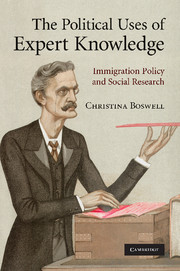Book contents
- Frontmatter
- Contents
- List of figures and tables
- Acknowledgements
- I The political functions of knowledge
- 1 The puzzle: explaining the uses of knowledge
- 2 Instrumental knowledge and organizational legitimacy
- 3 The symbolic functions of knowledge
- 4 The use of knowledge in public policy debates
- II The case of immigration policy
- III Extending the theory
- References
- Index
2 - Instrumental knowledge and organizational legitimacy
Published online by Cambridge University Press: 15 December 2009
- Frontmatter
- Contents
- List of figures and tables
- Acknowledgements
- I The political functions of knowledge
- 1 The puzzle: explaining the uses of knowledge
- 2 Instrumental knowledge and organizational legitimacy
- 3 The symbolic functions of knowledge
- 4 The use of knowledge in public policy debates
- II The case of immigration policy
- III Extending the theory
- References
- Index
Summary
Most accounts of how administrative departments make use of knowledge employ instrumentalist theories of knowledge use. Instrumentalist theories share the basic premise that knowledge is drawn on to inform the decisions of policymakers, or to enhance organizational output. Within this category of instrumentalist theory, we can discern two distinct approaches. The first is an essentially Weberian theory of knowledge utilization, according to which knowledge is valued for its problem-solving function. Organizations make use of knowledge in order to enhance the quality of their output, thus contributing to the realization of mandated organizational goals. The second approach derives its inspiration from Foucault's theory of knowledge and power. According to the Foucauldian account, an organization's use of knowledge can be understood as a technique of social control. Social knowledge becomes part of a discourse that structures and legitimizes relations of power.
The chapter considers these accounts, and rehearses some of the critiques that have been levelled at them. It argues that what has been missing from these debates is a more sophisticated understanding of organizational action. A considerable body of literature in organizational sociology has shown that organizations do not operate according to any consistent or coherent rationality – either in a Weberian sense of optimizing output, or in the Foucauldian sense of perfecting techniques of social control. Drawing on neo-institutionalist and systems-theoretic accounts of organizational action, I develop an alternative account of the use of knowledge in organizations.
- Type
- Chapter
- Information
- The Political Uses of Expert KnowledgeImmigration Policy and Social Research, pp. 29 - 60Publisher: Cambridge University PressPrint publication year: 2009



